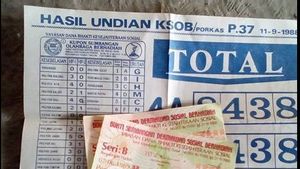JAKARTA Judi. This word may be one of the most popular words among the public. Starting from the middle to poor, parents, teenagers to children are familiar with the word gambling.
Moreover, gambling has many variants of the game. For example, dumplings, black jacks that are usually played in casinos, or lotterys, jiekie stamps and dices that are familiar in the lower class to the more contemporary ones, namely slot games that are often known as online gambling.
Quoted from National Geographic, gambling is one of the oldest activities of mankind. This is proven by the writing and equipment related to gambling found in many graves and other places. In addition, gambling is a much regulated activity, in the sense that it is very limited or even prohibited.
The rules regarding gambling have existed since the laws of Ancient China and the Romans as well as in the Jewish Talmud as well as by Islam and Buddhism. In ancient Egypt, for example, gamblers could be sentenced to forced labor in mines. Gambling is also closely associated with lottery.
the Bible contains many references to the provision of lotterys to share wealth, as written in Britannica. One well-known example is the draw by the Roman guards (which most likely means that they threw the bones of the fingerbook) to determine the clothes of Jesus during the Crossing.
However, in ancient times, throwing a lottery was not considered gambling in a modern sense, but was associated with destiny or unavoidable fate. Anthropers also point out the fact that gambling is more common in society where there is widespread trust in gods and spirits whose kindness can be sought.
Drawing, not infrequently using dice, has been used in many cultures to uphold justice and show criminals in court. In Sweden, this practice still lasts until the end of 1803. As for Greece, the word for justice in Greek, namely dike, comes from a word that means 'throwing', in the sense of throwing dice.
Organized gambling, which is on a larger scale and approved by governments and other authorities to raise money, started in the 15th century in the form of lottery. With the emergence of legal gambling houses in the 17th century, mathematicians began to take a serious interest in games with ruled equipment (such as dices and cards), from which the probability theory developed.
Putting aside gambling in Ancient China as well as in Ancient Roman and Greek, an organized official sporting betting event is arguably from the late 18th century. At that time, there was a gradual change, although irregular, in an official attitude towards gambling, from considering it a sin to consider it a crime and human weakness and, finally, seeing it as an activity that is mostly harmless and even entertaining.
SEE ALSO:
In Indonesia gambling has existed for a long time. The Indonesian people certainly know that in Mahabharata's story, the Pandavas were thrown into the forest for 13 years because they lost their dice gambling game against the Kauravas. Learning from history, one of the famous kings in the country, Ken Arok (Sri Ranggah Rajasa) The founder of the Singhasari Kingdom was known as a young man who likes to gamble.
Don't forget the cockfighting event which is one of the most traditional gambling forms in Indonesia that still often lasts until now. When the VOC came to Indonesia around 1620, they gave permission to all gambling houses, whether in the Batavia fort or outside the fort. The VOC made a huge profit from the gambling house because of the high tax application.
Since Souw Beng Kong, the first Kapitan Chinese in Batavia, the official gambling house has been established. Souw Beng Kong not only manages gambling places but also makes coins and weighing houses for Chinese goods. He was also given an excise right of 20 percent of the gambling tax imposed by the VOC on the owners of the gambling house.
Card and dice gambling, also called po, is quite famous among gambling fans in Batavia. Chinese people at that time also introduced a capjiki gambling. The European or Dutch lottery game only entered the Dutch East Indies in the middle of the 19th century.
There is also gambling in the form of lottery that emerged since the 1960s, which at that time was better known as the last lottery. At that time, in Bandung there was a lottery called Toto Raga as an effort to collect funds for horse racing. Meanwhile, in Jakarta when Governor Ali Sadikin appeared a lottery lottery lottery named Toto and Nalo (National Lotre).
In 1965, President Soekarno issued Presidential Decree No. 113 of 1965 which stated that the lottery was the aftermath of damaging the nation's morale and was included in the category of subversion. Entering the New Order, this lottery continued to grow. In 1968, the Surabaya Regional Government issued Lotto (Lotre Totalisator) PON Surya which had nothing to do with organizing sports, only based on lottery. The goal is to raise funds for PON VII which will be held in Surabaya in 1969.
In 1974, Toto KONI was removed. The government through the Minister of Social Affairs, Mintarydja (at that time) began to think of an idea to organize Forecast as a form of lottery without causing gambling excesses. After two years of comparative studies, the Ministry of Social Affairs concluded that the implementation of the UK forecast was carried out in a simple form and did not cause gambling excesses. In addition, the comparisons obtained by guessmakers, the government, and the prize for the guesser 40-40-20.
In 1976, after requesting another assessment from the Attorney General's Office, the State Intelligence Coordinating Board (Bakin) and the Department of Home Affairs, the Ministry of Social Affairs' plan to organize Forecasts did not face any challenges and planned the distribution of results 50-30-20. The plan could not be implemented, because President Suharto was careful and asked to be studied more deeply.
On December 28, 1985, the Sepakbola Porkas Award Coupon was inaugurated, circulated, and sold. Porkas is intended to raise public funds to support the development and development of Indonesian sports achievements. Porkas was born under Law No. 22 of 1954 concerning Undian, which among other things aims to prevent lottery that generate prizes from causing various social harm.
Different from Toto KONI, Porkas has no guess numbers, but M-S-K guessing or winning, series, and losing. Another difference is that if Toto KONI circulates to remote areas, then Porkas is circulating only to the district level and children under the age of 17 are prohibited from selling, distributing, and buying it.
This Porkas coupon consists of 14 columns and is drawn once a week, after 14 football groups have played 14 matches. The match schedule is determined by PSSI from the schedule at home and abroad. Each coupon holder who in 1985 was worth IDR 300 guessing which one won (M), drew (S), and lost (K). The best guessman of 14 teams received a prize of IDR 100 million.
At the end of 1987, Porkas changed its name to a Awarded Sports Donation Coupon (KSOB) and was more realistic. In SOB there are two kinds of coupons, coupons containing football guesses. This time, what is predicted in coupons is no longer losing like in Porkas, but also match scores, even the first half score and the second half. The second SOB coupon contains football guesses and letter guesses.
Yes, gambling cannot be separated from people's lives. Especially in the midst of economic problems, the temptation of getting money instantly through gambling sounds tempting. Herman (not his real name) for example. The 57-year-old man admitted that he had been playing gambling since he was a teenager.
He has tried various types of gambling ranging from dice, lottery, jiekie stamp or lottery. In fact, the habit of playing gambling does not stop even though he has retired from his job as a Civil Servant (PNS).
"Initially it was just fun, Mas. The first pair lost, so I was curious. Once I won, I even wanted to put it up again. Maybe that's what people often call, losing to make me curious, winning becomes addicted," said Herman while talking to VOI, Sunday, October 8.
The father of three children revealed that since conventional gambling such as dice and lottery were increasingly difficult to find, he chose to install a lottery which he called a Singapore lottery.
"We call it (the Singapore police station), even though the couple's money is collected here. It's up to you what number you want (to install), it's free. The stakes are usually from five thousand. Later when it comes out, we'll just have to look at the cellphone," explained Herman.
Herman's confession about losing to curiosity and winning addiction in gambling could be true. Former bookie, Dennis Lim revealed that the gambling player was not set to win. Gambling players can only win in two ways, given a dealer or become a dealer.
"If the gambling player wins once in a while, it is when the dealer gives the win. Bandar deliberately gives the win so that players continue to want to win," he said as quoted from Arie Untung's youtube channel.
The first way, it is the dealer's strategy to play psychologically gambling. That's why they are once given the win. If you have won, then your desire to win will continue to get bigger. "If this is the case, then the gambler will risk all the wealth he has to fulfill his lust for victory," added Dennis Lim.
The rise of gambling addiction cases according to Dr. Adhi Wibowo Nurhidayat, Sp.KJ (K) MPH from the Indonesian Mental Medicine Specialist Association is caused by pathological gambling or compulsive gambling, making a person unable to restrain his desire to gamble. This can cause severe financial problems, job loss, crime or fraud, and damage to family relations.
He explained that compulsive gambling started at the beginning of youth in men, and between the ages of 20 and 40 in women. People with compulsive gambling disorders have difficulty holding back or controlling the urge to gamble. Their brains react to these pulses in the same way as reacting to someone who is addicted to alcohol or drugs, "said Adhi, Thursday 5 October.
Alexandra Adeline, M.Psi, psychologist from Mind and Behavior Clinic Ciputra Medical Center said that Gambling Addiction or commonly called Compulsive Gaming is a condition in which a person is unable to withstand the urge to continue gambling or risking something without considering the bad effects that can be imposed on it.
According to him, there are several factors that affect a person who is addicted to gambling, including the sensation of a tense feeling while waiting for the winning or losing results when gambling is a pleasure for players. This is related to increasing activity in the brain area that is connected to the Dopamine nerve (a neurotransmitter formed in the brain that functions to signal between nerve cells or nerve cells with other cells).
Second, is an orientationd target where the habit factor in a person is to be more outcome-oriented than the process in his efforts to achieve something. Third, the formation of endorphins in the body is related to pleasure when a person is playing gambling.
Even when someone loses, the body still produces adrenaline and endorphins. At this stage, a person's motivation to play gambling is no longer a matter of profit, but as a means of entertainment for himself," concluded Alexandra.
The firmness of law enforcers in eradicating gambling that is rampant in Indonesia is also emphasized directly by the National Police Chief General Listyo Sigit Prabowo. The former Banten Police Chief emphasized that if a member of the police who is involved in a criminal act of gambling will be brushed off indiscriminately.
"I do not tolerate if there are still arrests, I remove the official, I don't care whether it's the Police Chief, whether it's the Director, whether I remove the Regional Police Chief. Likewise at Headquarters, please pay attention, I will also remove it," said Sigit.
Sigit's firmness shows that all gambling games on land and online must be dealt with. The former Kabareskrim said that he had twice to remind all police officers regarding gambling crimes.
"Starting from some time ago, I have ordered what is called gambling, I repeat what is called gambling whatever form it is, whether it is online or all of it must be done. I repeat what is gambling, whether it is land gambling, online gambling, and various forms of other criminal offenses must be committed," said Sigit.
The English, Chinese, Japanese, Arabic, and French versions are automatically generated by the AI. So there may still be inaccuracies in translating, please always see Indonesian as our main language. (system supported by DigitalSiber.id)
















